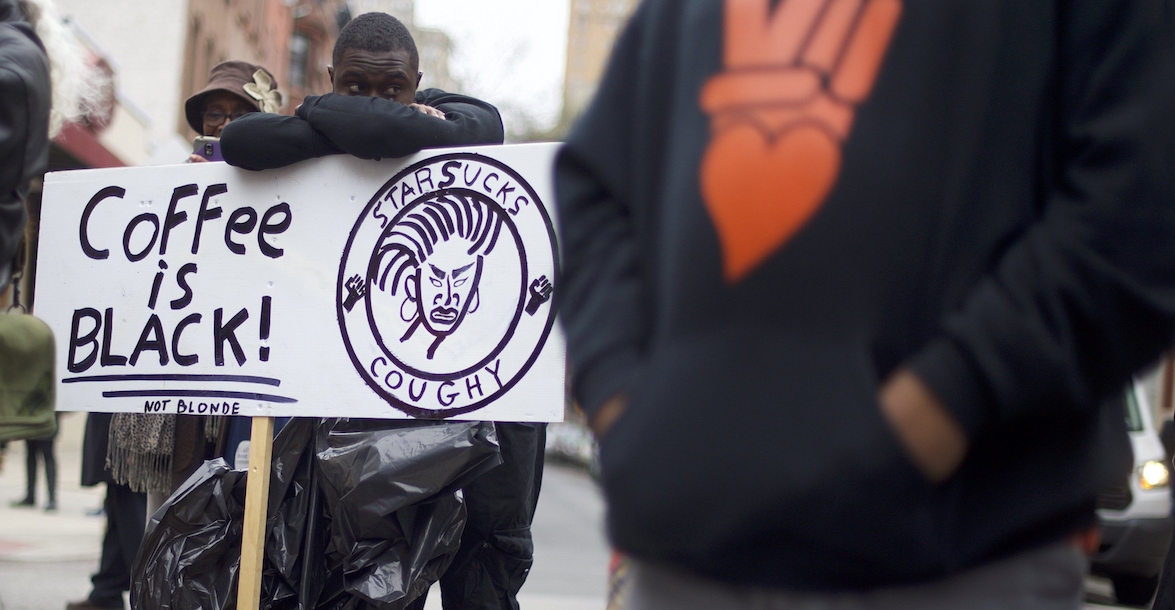As a former Executive Director of Philadelphia’s Commission on Human Relations, watching Melissa DePino’s disturbing video of two Black men being arrested at a Starbucks cafe made me ill—and angry. But neither illness nor anger is sufficient to address where we are as a culture, nor where we need to go. What we need is a trenchant analysis of what that video captured, and what we need to do about it.
First of all, the video did not show us that Starbucks is racist. That scene—Black men being arrested for nothing—plays out daily, in a myriad of venues, in hundreds of locales. The video doesn’t specifically show us that Starbucks is racist; instead it shows that Starbucks isn’t immune from the racism that is woven into the fabric of America.
The responding officers should have told the Starbucks management that they had no cause for arrest. Period. Full stop.
But let’s move on to what that video did show us, and that is that a white person’s discomfort with any Black presence can readily find validation from legal authority. It showed us that simply by existing, a Black person may be perceived as threatening or illicit by a white person, and that those perceptions can then become a de facto cause of legal action.
Hear me clearly; I am not indicting ANYONE for feeling discomfort—we all have the right to feel what we feel. But what I am indicting is the validation of unjustifiable feelings of discomfort by legal authority.
So that means that in this case I am indicting the Philadelphia Police Department.
Again, allow me to clarify. What occurred at Starbucks was not a case of police brutality (though it must be noted that the posturing of some of the officers could have easily escalated the tension, had the two Black men been less composed). Instead, this was a case of a misapplication of police power.
Simply put, the responding officers should have told the Starbucks management that they had no cause for arrest. Period. Full stop. Doing anything other than that would lend legal authority to personal bigotry and bias, and thereby reinforce the legacy of American racism, which is built on a foundation of the premise that white comfort is an American priority.
And that is exactly what happened at Starbucks last week.
In responding to this matter Police Commissioner Richard Ross was actually partially correct when he asserted that his officers “did nothing wrong.” But that perspective alone is shortsighted; the better evaluation for law enforcement is what did they do right? In this case, where a show of police force was brought to bear upon two innocent Black men—placing their lives in imminent danger (e.g. see, “Garner, Eric”, or “Castile, Philando”)—it is my opinion that the police did little right.
Finally, for those of us outraged by what this video captured, we must make sure that the proposed cure does not compound the disease! By this I point to the angry and righteous outcry to “fire the manager” or the barista who initiated the complaint. This, too, is shortsighted.
Police Commissioner Richard Ross was actually partially correct when he asserted that his officers “did nothing wrong.” But that perspective alone is shortsighted; the better evaluation for law enforcement is what did they do right?
Making one or two people unemployed doesn’t address the problem—in fact it could, worsen it! Allow me to don my clergical hat, and say that true justice must always seek to find redemptive remedies in response to offenses. Instead of firing them, let’s make Starbucks require these errant employees to engage in a process that will help to redeem them from their implicit bias. Added to that, Starbucks itself should be made to demonstrably contribute to activities designed to foster racial equity.
I support those who are angrily protesting at Starbucks in downtown Philly, and I understand the outrage behind the demands for the firing of personnel who may have initiated this police action.
But anyone who focuses on angry protests and firings as a solution should wake up and smell… well, whatever it is that they are offering at Starbucks today.
Nick Taliaferro is the immediate past Executive Director of the Philadelphia Commission on Human Relations, a former talk show host, and currently pastors the West Philadelphia SDA Church in the University City section of Philly.


